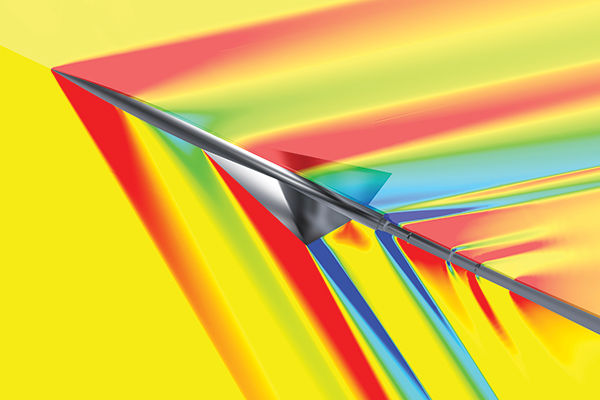It's easy to start your application.
Graduate Programs
PhD in Aerospace Engineering

The quantitative requirement for the PhD degree in Aerospace Engineering is 72 credit hours. Of these, 36 to 48 units must be course credit, and 24 to 36 units must be research credit, MEMS 600. Units earned toward a previous MS in Engineering may be counted towards these totals.
Full Support & Funding
Our PhD students are fully funded, including full tuition support and health insurance. As a doctoral candidate, you will also receive a generous stipend to cover living expenses. This support is guaranteed as you continue to make satisfactory progress towards your degree.
Degree Highlights:
- The overall grade-point average must be 3.00 or better.
- Full-time doctoral students in any area are required to take MEMS 501 Seminar every semester. This is a zero-unit, pass-fail course.
- Courses may be chosen from 400- and graduate-level engineering courses with the following restrictions:
- A maximum of 3 units of Independent Study, MEMS 500, are allowed.
- A maximum of 6 units of 400-level courses are allowed, and these must be from courses not required for the BSAE degree (if counted for the MSAE degree).
- Each course must be approved by the candidate's thesis advisor.
- The student must pass the qualifying examination, successfully present a thesis proposal, write a satisfactory thesis and successfully defend it in an oral examination before a faculty committee. The committee should consist of at least five members, at least three of which are from the Department of Mechanical Engineering and Materials Science. At least one member must be from outside of the department.
- A residency requirement of two consecutive semesters of full-time enrollment in doctoral studies is also required. To receive a PhD, the candidate must satisfy the applicable teaching requirements.
Frequently asked questions
What is the typical educational background of a student admitted into the Aerospace Engineering PhD program?
Most students typically have a BS or an MS in either Mechanical or Aerospace Engineering.
What can I do with a PhD in Aerospace Engineering?
With a degree in aerospace you can work in the aerospace industry, wind turbine companies, the automotive industry, the railroad industry, or any industry that involves vehicles. Many Wash U students have gone to Caterpillar Tractor for example. You can also teach with this degree. In those companies or in government you could work on research and on new, innovative designs. Every company in the world hires those with an ME degree, but those with a Ph.D. specialize in the latest products that involve new technology.
Why should I choose to study at Wash U?
Washington University is a prestigious, well-endowed private university, which creates stability (we don't rely on direct government funding for our operations), flexibility, and opportunity. Saint Louis is a city with a low cost of living and a high quality of life (many students and faculty have a short, pleasant walk to school). However, it is big enough to be cosmopolitan and to offer many cultural, dining, and entertainment opportunities.
How long does it take to earn a PhD?
While there is no fixed time to complete a PhD, most students finish in approximately five years.
How do I find housing?
There are a number of resources offered by the Graduate School in regard to housing, transportation and support for both domestic and international students. All students have access to a free UPass which covers universal rail and bus transportation. The University assists graduate students with finding suitable off-campus housing through quadrangle.wustl.edu.
Is St. Louis safe?
Overall, St. Louis is a safe and healthy city, with crime rates that are typical of medium-sized US metropolitan regions. St. Louis, like other major cities, faces social disparities and inequities, and some neighborhoods are safer than others. WashU is committed to promoting systemic change and keeping students safe. The EECE program is centrally located on WashU’s Danforth Campus. Adjacent to campus you will discover a rich cultural life that supports your time outside of the classroom: the coffee shops and music venues of the Delmar Loop, as well as the museums and trails of nearby Forest Park, voted “Best City Park” by USA Today. The campus is served by several MetroLink light rail stations and bus lines, making the area easy to navigate. Go to police.wustl.edu for statistics and information recommended for safety precautions. Learn more about St. Louis.
What is the amount of time required weekly for research?
Students are expected to commit 40 hours/week towards the program. This includes time for both academic coursework as well as research.
Will I have time to have a social life?
You will have as much time for a social life as you would in any other full-time job.
What does it mean to be “fully-funded”?
We provide monetary support for living expenses, tuition and a portion which you will apply to health insurance and fees. This stipend is adjusted each year for living expenses.
Will I be able to obtain outside scholarships?
Yes. Information on the various outside scholarships and how to apply for them is available at provost.wustl.edu/vpge/fellowships-funding-and-support
Are there resources on campus that support PhD students?
Yes, Habif Health and Wellness offers medical and mental health services for graduate students. The Graduate center offers a variety of clubs, seminars and workshops specifically geared toward graduate students. AGES is the Association of Graduate Engineering students and all PhD students are members. The Association offers networking events and social events. In addition, McKelvey Graduate Student Services office offers support for PhD students for a variety of issues. Eng-gradstudserv@wustl.edu
Can I contact a current McKelvey Graduate Student?
Yes, our Graduate Student Ambassadors are happy to answer your questions.
